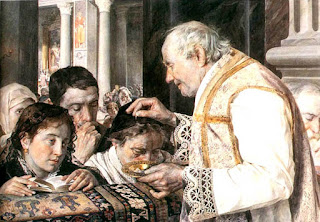Remembering that We Are Dust
Spending Ash Wednesday ill in bed, I was unable to write an appropriate reflection for the Fellowship, or even attend mass. The only devotion I managed was reciting Psalm 103 in my little Authorized Version psalm book. Of course, I chose this psalm because I remembered that it echoed the line from Genesis, "Dust you are and to dust you shall return." (Gen. 3:19) Imagine my surprise, then, to realize when I reached verse 14 that in fact it read, "For he knoweth our frame; he remembereth that we are dust."
The Psalmist has taken a refrain from throughout the Old Testament, a reminder to mankind that we are mortal, that we are sinful, and that we must act accordingly, (see Eccl. 5:15, Ps. 104:29, Isa. 40, and Ps. 90) and turned it on its head. There is more to "Ashes to ashes and dust to dust" than only the command to "redeem the time, because the days are evil." (Eph. 5:16) There is another side: that God does not forget that we are dust, and so he "has not dealt with us according to our sins; nor has he repaid us according to our wickedness." (Ps. 103:10)
While on Ash Wednesday we are reminded that we will die with ashes imposed on our foreheads, they are imposed in the shape of the cross. In the Cross of Christ, the Psalmist's statement that God "remembers that we are dust" takes on new depth. Not only can we say that God knows because He made us, but He even knows because He took on our dust and ash and experienced the transience of life and passed into death. He called to mind our frailty and entered the world of humanity to impose upon our ashes a new shape: "Take up your cross."
And this is what the Psalmist also requires of his audience:
"And merciful is the Lord from everlasting; and unto everlasting on his fearers; and his righteousness
to their sons' sons.
To the keepers of his covenant; and those who remember his instructions to keep them." (Ps. 103:17-18)
The Covenant Christ makes with us is precisely the cross, "this cup is the new covenant in my blood, which is shed for you." (Luke 22:20) in the Eucharist, in dying with Christ in Baptism, and in our daily struggle, which we are made especially aware of in Lent, to live a cruciform life by fearing God and loving our neighbors, we are made the recipients of this grace the Psalmist mentions.
And so our response in this Lenten season must be, with the Psalmist, "Bless the Lord, O my soul; and forget not all his benefits...the redeemer of my life from destruction; who crowns me with mercy and compassion." (103:2, 4) The imposition of ashes then becomes our reminder of what God has already remembered, what He always has before his eyes: not only our mortality, but the death and resurrection of Christ.
 |
| Polish priest imposing ashes (unknown, 1881) |
While on Ash Wednesday we are reminded that we will die with ashes imposed on our foreheads, they are imposed in the shape of the cross. In the Cross of Christ, the Psalmist's statement that God "remembers that we are dust" takes on new depth. Not only can we say that God knows because He made us, but He even knows because He took on our dust and ash and experienced the transience of life and passed into death. He called to mind our frailty and entered the world of humanity to impose upon our ashes a new shape: "Take up your cross."
 |
| Christ carrying the cross El Greco |
"And merciful is the Lord from everlasting; and unto everlasting on his fearers; and his righteousness
to their sons' sons.
To the keepers of his covenant; and those who remember his instructions to keep them." (Ps. 103:17-18)
The Covenant Christ makes with us is precisely the cross, "this cup is the new covenant in my blood, which is shed for you." (Luke 22:20) in the Eucharist, in dying with Christ in Baptism, and in our daily struggle, which we are made especially aware of in Lent, to live a cruciform life by fearing God and loving our neighbors, we are made the recipients of this grace the Psalmist mentions.
And so our response in this Lenten season must be, with the Psalmist, "Bless the Lord, O my soul; and forget not all his benefits...the redeemer of my life from destruction; who crowns me with mercy and compassion." (103:2, 4) The imposition of ashes then becomes our reminder of what God has already remembered, what He always has before his eyes: not only our mortality, but the death and resurrection of Christ.



Comments
Post a Comment